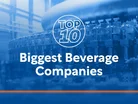Top 10: Biggest Beverage Companies

The global beverage industry is navigating a sea of change in the market.
Amidst a whirlwind of transformation, the global beverage industry finds itself at a pivotal crossroads.
Gone are the days of sugary staples dominating supermarket shelves, as today's consumers are seeking adaptations. A perfect storm of health-conscious punters, sustainability drives and supply chain snags has sent shockwaves through the sector.
But the industry’s leaders are adapting to stay ahead of the curve. From low-sugar libations to plant-powered potions, beverage leaders are shaking up their portfolios.
Meanwhile, the push for planet-friendly packaging is gaining momentum, with firms investing resources into sustainable solutions and despite economic headwinds that could flatten the fizz of lesser industries, the beverage market is proving resilient.
Projections suggest substantial growth on the horizon, with non-alcoholic offerings leading the charge and as the industry navigates these choppy waters, it's clear that innovation and sustainability are essential ingredients for success.
10: Monster Beverage
Headquarters: Corona, USA
Market cap: US$49.07bn
Monster Beverage Corporation, a leading energy drink manufacturer, has expanded its global presence through strategic partnerships and acquisitions, with the company collaborating with Coca-Cola for distribution and recently acquiring Bang Energy, an American brand of energy drinks.
Monster is also diversifying its portfolio with healthier options, including zero-sugar and low-calorie drinks, while expanding into new beverage categories.
9: Nongfu Spring
Headquarters: Hangzhou, China
Market cap: US$50.75bn
Nongfu Spring, one of China's largest packaged water suppliers, has expanded into diverse beverage categories including tea, functional drinks, and juices.
The company focuses on natural, healthy products and has secured strategic water sources across China and is innovating with new offerings like plant protein drinks and coffee while leveraging big data to optimise distribution.
8: Heineken
Headquarters: Amsterdam, Netherlands
Market cap: US$54.36bn
A brewing leader, Heineken, formed Heineken Beverages in 2023 through a merger with Distell and Namibia Breweries.
The company collaborates with Coca-Cola for distribution and recently acquired a stake in Stelz.
And whilst Heineken is innovating with new product launches, including non-alcoholic and flavoured beers, advancing supply chain capabilities, it’s aiming to enhance market leadership, drive sustainability, and cater to evolving consumer preferences.
7: Wuliangye Yibin
Headquarters: Yibin, China
Market cap: US$67.50bn
Specialising in producing baijiu, a traditional liquor made from grains, Wuliangye Yibin, is a leading Chinese alcoholic beverage company.
The company recently signed a memorandum of understanding with Campari Group to collaborate on strategic goals in China and international markets.
With a rich heritage dating back to the Ming Dynasty, the company aims to strengthen its market leadership, promote Chinese spirits culture, and develop new products for diverse occasions while exploring cocktail culture with international partners.
6: Diageo
Headquarters: London, UK
Market cap: US$71.34bn
Diageo, a British multinational and global leader in premium alcoholic beverages, boasts a portfolio of over 200 iconic brands, including Johnnie Walker, Guinness, and Smirnoff.
The company collaborates with LVMH, owning a 34% stake in Moët Hennessy and is currently focusing on product innovation, sustainability, and expanding its no- and low-alcohol offerings to meet evolving consumer preferences.
5: Starbucks
Headquarters: Seattle, USA
Market cap: US$82.40bn
The global coffee giant, Starbucks, dominates the specialty coffee market with over 28,000 locations worldwide.
Their aim is to strengthen customer loyalty, drive global growth, and lead in environmental stewardship.
The company collaborates with Nestlé through the Global Coffee Alliance and has partnered with Pepsi for ready-to-drink beverages. Starbucks is currently focusing on expanding its digital presence, enhancing sustainability efforts, and innovating with plant-based options and cold beverages.
4: Anheuser-Busch Inbev (ABInBev)
Headquarters: Leuven, Belgium
Market cap: US$117.43bn
With a strong emphasis on innovation, Anheuser-Busch InBev aims to lead the industry in addressing changing consumer preferences, particularly amongst younger demographics.
ABInBev's strategic partnerships, such as its collaboration with Keurig Dr Pepper, further strengthen its position in the global beverage market and boasts a portfolio of over 500 brands, including global icons like Budweiser, Corona, and Stella Artois.
The company's 2016 merger with SABMiller cemented its market dominance. AB InBev is currently focusing on premiumisation, expanding its non-alcoholic and low-alcohol offerings, and investing in sustainability initiatives.
3: PepsiCo
Headquarters: New York, USA
Market cap: US$222.57bn
PepsiCo, a global beverage and snack giant, boasts iconic brands like Pepsi, Gatorade, and Lay's.
The company's 1965 merger of Pepsi-Cola and Frito-Lay created a powerhouse, further strengthened by acquiring Quaker Oats in 2001.
PepsiCo is currently focusing on healthier options, sustainability, and digital innovation to meet evolving consumer demands and with a strong emphasis on international expansion and product diversification, PepsiCo aims to maintain market leadership whilst addressing environmental concerns and adapting to changing lifestyle trends worldwide.
2: Kweichow Moutai
Headquarters: Zunyi, China
Market cap: US$248.19bn
Focusing on premiumisation and international expansion, Moutai is diversifying its portfolio with new cocktail series as China's premier baijiu producer, renowned for its luxury spirits.
The company recently partnered with Luckin Coffee to launch innovative products like chocolate-flavoured Moutai lattes.
Focusing on premiumisation and international expansion, Moutai is diversifying its portfolio with new cocktail series.
Moutai aims to modernise traditional Chinese liquor, emphasising green development and cultural heritage while pursuing global recognition for baijiu in the premium alcohol market.
1: Coca-Cola
Headquarters: Georgia, USA
Market cap: US$270.06bn
Coca-Cola, provider of one of the world’s most iconic drinks from 1886, the global beverage giant has a vast portfolio of over 500 brands sold in more than 200 countries.
With a strong emphasis on digital transformation and premiumisation, Coca-Cola aims to maintain market leadership while addressing environmental concerns and adapting to changing lifestyle trends globally.
The company also collaborates with Nestlé, another giant across multiple industries through the Global Coffee Alliance and partners with bottlers worldwide.
Coca-Cola is currently focusing on product innovation, sustainability initiatives, and expanding its non-alcoholic offerings to meet evolving consumer preferences.
--------------
Make sure you check out the latest news at Food Digital, a BizClik brand.







